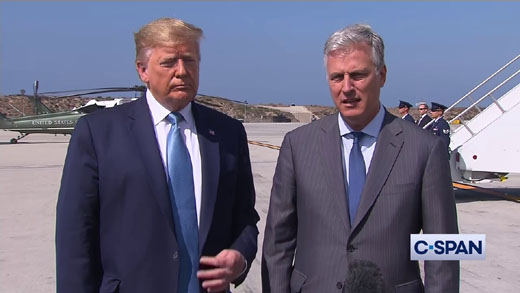by WorldTribune Staff, June 10, 2020
False reporting by China to the World Health Organization (WHO), inconsistent advice from so-called “experts”, and misleading reports from the major media all contributed to U.S. intelligence agencies underestimating the seriousness of the coronavirus outbreak in the crucial early stages, a report said.

Reforms at the National Security Council (NSC) involving staff streamlining and more efficient decision-making procedures that were put into place over the past several months were significant in helping President Donald Trump recognize the seriousness of the coming pandemic in late January, national security adviser Robert O’Brien said in an interview with Washington Times reporter Bill Gertz published on June 10.
“The [intelligence community] first briefed the president on this on Jan. 23,” O’Brien said. “On Jan. 28 at the Oval [Office] briefing, the [intelligence community] was still saying this is something like the flu and not as serious as SARS.”
Gertz noted that “Getting consistent expert advice of the challenge posed by COVID-19 has been a challenge for public health officials and government leaders around the globe. Just this week, the World Health Organization was trying to clear up confusion caused by an official who said transmission of the virus by people showing no symptoms of the disease was ‘rare.’ ”
After the Jan. 28 Oval Office briefing, O’Brien said, he “elevated the issue” for the president, who immediately grasped the magnitude of what would eventually become the COVID-19 pandemic.
Several advisers at the time recommended against imposing a travel ban on China. Two days after the Jan. 28 briefing, Trump went ahead with imposing a ban on most flights from China.
“There were, of course, concerns expressed over how the ban would affect the stock market and the world economy, but the president put the health of the American people first,” O’Brien said. “Within two days of the president being told by the NSC that COVID-19 constituted a serious national security risk, on the 30th, he had made the decision to ban travel from China.”
The ban went into effect on Jan. 31, the same day the president announced the formation of the task force on the virus that eventually became the unit headed by Vice President Mike Pence.
“The stories about the president not moving quickly are just not true,” O’Brien said. “He moved very quickly. As soon as he was alerted by the NSC that this was a serious problem, he took decisive action.”
A senior U.S. intelligence official confirmed to Gertz that intelligence analysts underestimated the danger of the coronavirus outbreak, which Chinese government authorities officially acknowledged on Jan. 23 — at least a month after the first cases were detected in Wuhan, China.
A new report by Harvard University researchers is saying that China knew of the virus in Wuhan as early as August of last year.
The initial Jan. 23 report was provided by CIA analyst Beth Sanner, who in 2019 became the main presenter of Trump’s daily presidential briefing, or PDB, as the high-level, top-secret presidential intelligence briefing is called, The New York Times reported.
Mr. Trump, a frequent critic of the quality of U.S. intelligence, tweeted May 3 that intelligence agencies “just reported to me that I was correct, and that they did NOT bring up the coronavirus subject matter until late into January, just prior to my banning China from the U.S.”
The president also said in the tweet that intelligence briefers “only spoke of the virus in a very non-threatening, or matter of fact, manner.”
The comments followed several press reports, including a Washington Post article, defending intelligence agency responses to the coronavirus and noting that more than a dozen PDB reports carried articles on the virus in January and February.
A U.S. intelligence official said those reports were misleading and that the reporting increased only after China announced the outbreak.
Critics say Beijing also provided false or delayed information to the WHO that resulted in inaction around the world in response to the outbreak. For example, Chinese authorities told WHO that the virus was not transmitted from human to human and that travel should not be restricted. Both were wrong and yet were published in a Jan. 12 WHO statement.
Asked about published reports that intelligence reports from daily briefings discussed the threat of the virus, Trump said May 3 that other political leaders, including House Speaker Nancy Pelosi, California Democrat, and Senate Minority Leader Chuck Schumer, New York Democrat, were playing down the danger.
The first information about the virus from intelligence agencies arrived on Jan. 23, Trump told Fox News Channel. The first U.S. response was made a short time later, “but I didn’t do it because of what they said,” he added.
O’Brien said he is convinced that the truth about the virus and its origin will eventually be revealed.
“It is hard because the Chinese have clammed up and shared so little information about the virus,” O’Brien told Gertz. “And, so many people who were originally whistleblowers and mouthpieces about what was happening in Wuhan have been silenced.”
Intelligence Brief __________ Replace The Media
